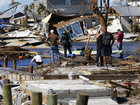Hurricane Orlene swept toward landfall on Mexico's Pacific coast near the tourist town of Mazatlan on Monday.
Orlene lost some strength after roaring over the Islas Maria, a former prison colony being developed as a tourist draw. The main island is sparsely populated, mainly by government employees, and most buildings there are made of brick or concrete.
 Full Story
Full Story
People kayaking down streets that were passable just a day or two earlier. Hundreds of thousands without power. U.S. National Guard helicopters flying rescue missions to residents still stranded on Florida's barrier islands.
Days after Hurricane Ian carved a path of destruction from Florida to the Carolinas, the dangers persisted, and even worsened in some places. It was clear the road to recovery from this monster storm will be long and painful.
 Full Story
Full Story
Farmers in a small town perched on a northern Lebanese mountain have long refused to accept defeat even as the government abandoned them to a life off the grid.
Harf Beit Hasna receives almost no basic services. No water or sewage system, no streetlight or garbage collection. The only public school is closed. The nearest pharmacy is a long drive down a winding mountain road.
 Full Story
Full Story
Monster Hurricane Ian brought a "500-year flood event" to Florida, devastating coastal cities, inundating homes and businesses and leaving island communities cut off, Florida Governor Ron DeSantis said Thursday.
 Full Story
Full Story
Hurricane Ian left a path of destruction in southwest Florida, trapping people in flooded homes, damaging the roof of a hospital intensive care unit and knocking out power to 2 million people before aiming for the Atlantic Coast.
One of the strongest hurricanes to ever hit the United States barreled across the Florida peninsula overnight Wednesday, threatening catastrophic flooding inland, the National Hurricane Center warned.
 Full Story
Full Story
Hurricane Ian tore into western Cuba on Tuesday as a major hurricane, with nothing to stop it from intensifying into a catastrophic Category 4 storm before it hits Florida on Wednesday.
Ian made landfall at 4:30 a.m. EDT Tuesday in Cuba's Pinar del Rio province, where officials set up 55 shelters, evacuated 50,000 people, rushed in emergency personnel and took steps to protect crops in Cuba's main tobacco-growing region.
 Full Story
Full Story
The Asian Development Bank said Tuesday it will devote at least $14 billion through 2025 to help ease a worsening food crisis in the Asia-Pacific.
The development lender said it plans a comprehensive program of support to help the 1.1 billion people in the region who lack healthy diets due to poverty and soaring food prices.
 Full Story
Full Story
Vietnam imposed a curfew and evacuated over 800,000 people as a powerful typhoon that had flooded villages and left at least eight dead in the Philippines aimed Tuesday for the country's central region.
People living near the coast where Typhoon Noru was expected to slam early Wednesday had been ordered to take shelter, national television VTV said. Schools were closed and public events canceled.
 Full Story
Full Story
Germany lost one of its few remaining glaciers this summer as exceedingly warm weather ate away Alpine ice at a faster pace than feared, a scientific report released on Monday showed.
 Full Story
Full Story
While world leaders from wealthy countries acknowledge the "existential threat" of climate change, Tuvalu Prime Minister Kausea Natano is racing to save his tiny island nation from drowning by raising it 13 to 16 feet (4 to 5 meters) above sea level through land reclamation.
While experts issue warnings about the eventual uninhabitability of the Marshall Islands, President David Kabua must reconcile the inequity of a seawall built to protect one house that is now flooding another one next door.
 Full Story
Full Story



